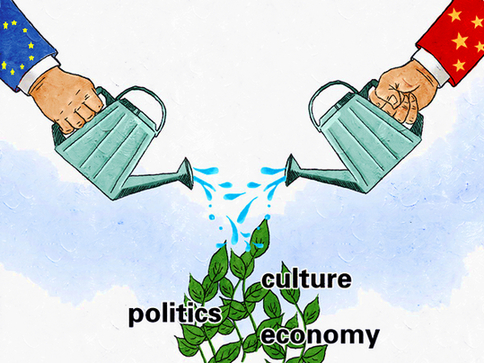Xi's Europe visit seeks mutual trust and respect
- By Xiao An
 0 Comment(s)
0 Comment(s) Print
Print E-mail China.org.cn, March 21, 2014
E-mail China.org.cn, March 21, 2014
Chinese President Xi Jinping from March 24 onwards will pay state visits to the Netherlands, France, Germany and Belgium. Speaking at a press conference on the sidelines of China's annual parliamentary session, Foreign Minister Wang Yi stated that the nation's European ties formed a priority on China's diplomatic agenda. He then further explained how the visit would signify a new chapter in China-Europe relations.
|
|
|
Miracle growth [By Zhai Haijun/China.org.cn] |
After years of development, China-Europe relations have become one of the world's most important big power relationships. The cooperation between China and Europe brings the world a sense of balance and stability.
The Europe Xi will visit is one in decline. Over the past several years, Europe's self-renewal efforts were continuously hindered due to internal conflicts, the debt crisis, the liquidity squeeze and a regional political crisis. In seeking to revive itself, Europe has fully recognized the strategic and economic significance in strengthening its relations with China. There's now a growing enthusiasm across Europe to strengthen coordination with China.
A rising China and an integrated EU share many interests; together they can make the world a more balanced and secure place. There is no fundamental conflict of interest between China and the EU, regarding the Iran, Ukraine and Syria crises that pose a great problem for European countries. As a result, there's a sound base for the development of China-EU cooperation.
The Europe Xi will visit is one undergoing structural reforms. The EU's Economic and Financial Affairs Council is particularly involved in this bid to improve the economic rationale of structural reforms and important EU policies. The reform the EU now undergoes, echoes the reform that China pushes forward. Europe applauds China's market-oriented reforms and actively promotes China-EU investment agreement negotiations. It hasn't ruled out the possibility of establishing a China-EU FTA.
There is also substantial support between China and Europe. When the Eurozone was deeply in debt, China helped ease the strain by acquiring bonds from various periphery countries. Euro reserves once accounted for about one fourth of China's total foreign exchange reserves; this in turn contributed to the internationalization of the RMB. It's time for the EU now to support China in its reform.






